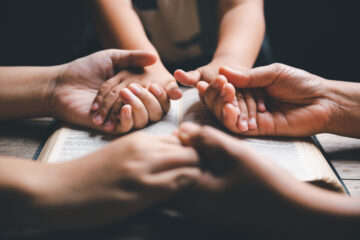And standing by the cross of Jesus his mother, and the sister of his mother, Mary the wife of Clopass, and Mary, the Magdalene. Jesus, therefore, seeing his mother and the disciple whom he loved standing by, said to his mother; “Woman, behold thy son.” Then, he said to the disciple: “Behold thy mother.” And from that hour the disciple took her to his own home.
John 19:25-27.
Sentenced to death by Roman crucifixion, in a political mock trial, beaten and flogged, then fastened with nails through his wrists to a rugged crossbeam, his legs twisted in an unnatural position and nailed grotesquely in place, stripped of all human dignity and despised by onlookers. There were no words in the English language to describe such torture and agony, and so a new word had to be invented. Excruciating literally means “out of the cross”.
Yet, in the midst of this indescribable anguish, Jesus gives us a divine example of love and veneration toward his earthly mother, Mary.
Christ loved and honored his mother. He fulfilled the fifth commandment as perfectly as he fulfilled them all. He also took responsibility for his earthly duty to see that his mother was cared for in her old age. Mary would have been near age fifty at this time, and by contemporary standards, would have been considered an elderly widow.
Supporting & Caring for Widows on Mother’s Day
Why did Christ commit his mother’s care to John the beloved disciple? Why not his own brothers? We are told in John 7:5 that “his brothers were not believing in him.” There is no record of their presence at the cross. They became believers later after Jesus rose from the dead. Acts 1:14 records that they were among the group meeting for prayer in the Upper Room when the Holy Spirit came at Pentecost: “These all with one mind were continually devoting themselves to prayer, along with the women, and Mary the mother of Jesus, and with his brothers”.
Honoring parents was considered a virtue in the Roman world. But Rome did not create a legal obligation to care for parents, and a child who refused to do so could not be compelled by the courts. Unlike the Romans, Jewish tradition placed great responsibility on adult children to care for their aging parents. The Torah states three times over that children should honor and revere their parents to honor, especially as they become physically or mentally frail with age.
Jesus’ example of providing for the care of his widowed mother is regrettably not echoed in our system of laws today. In the U.S., requiring that children care for their elderly parents is a state-by-state issue. Many states do not impose any obligation to care for one’s aging parents. Currently, 27 states have what are called “filial responsibility” laws. The term “filial responsibility” refers to an adult child’s duty to support his or her parents. In recent years, as Medicare and other federal regulations affecting the elderly have become increasingly more complex, a new area of legal practice has emerged known as “Elder Law.”
Crain Law Group is dedicated to providing legal advice and assistance to families in caring and “honoring” their elderly, dependent or disabled parents.
Larry L. Crain, Crain Law Group, PLLC – www.crainlaw.legal













